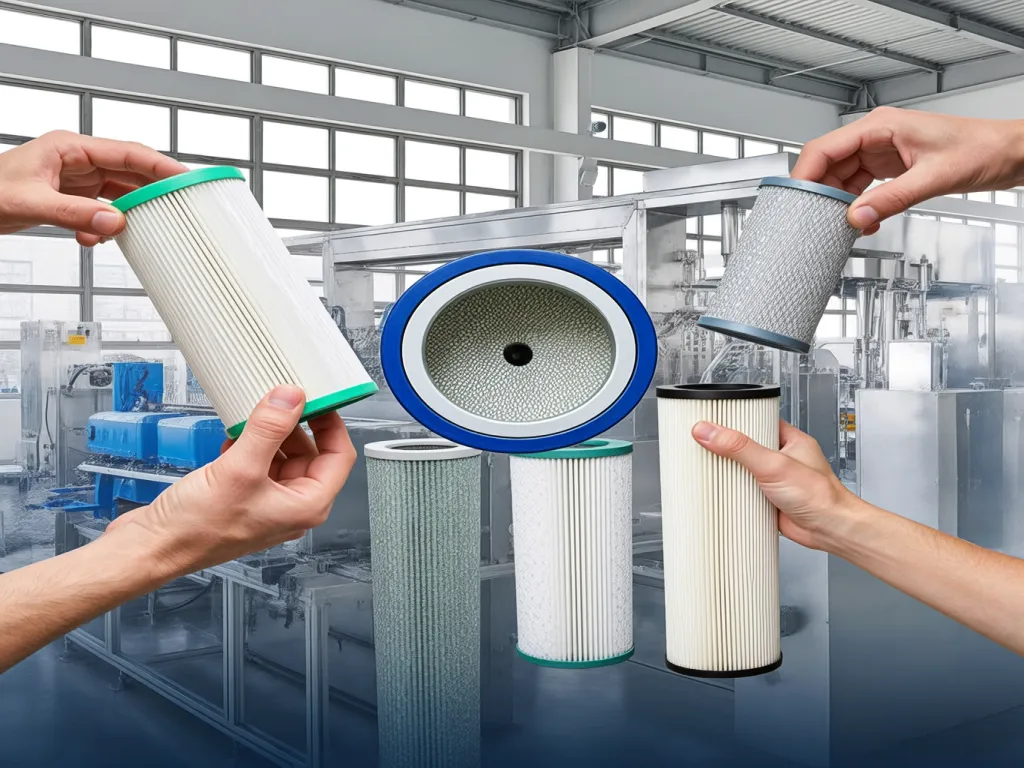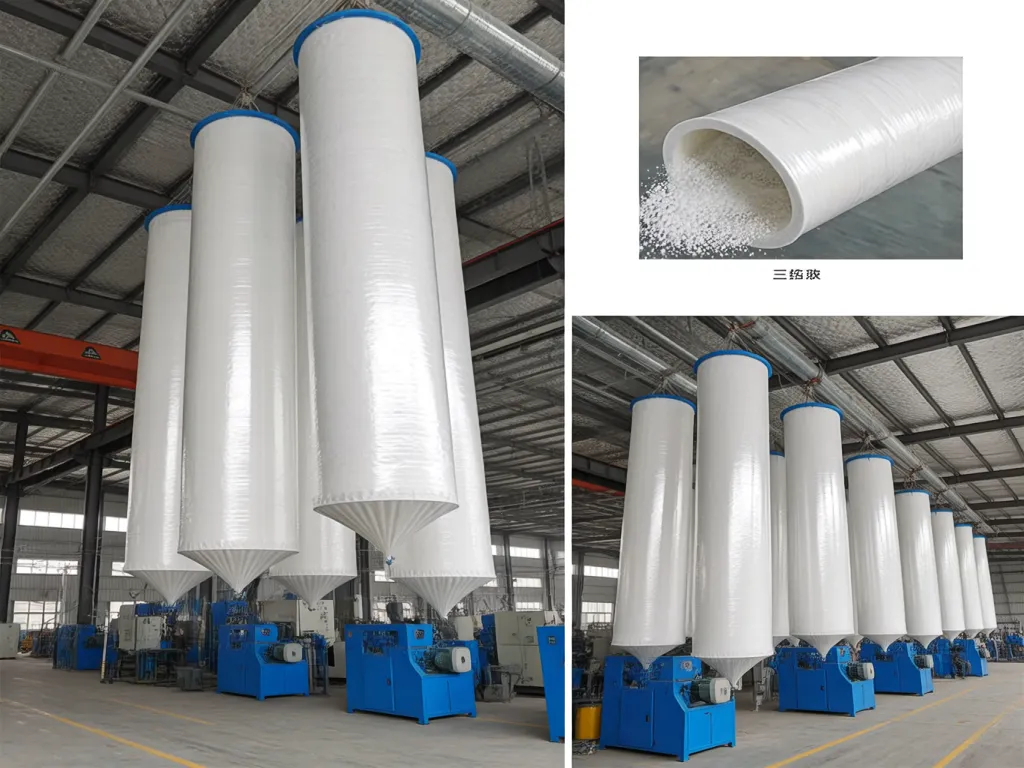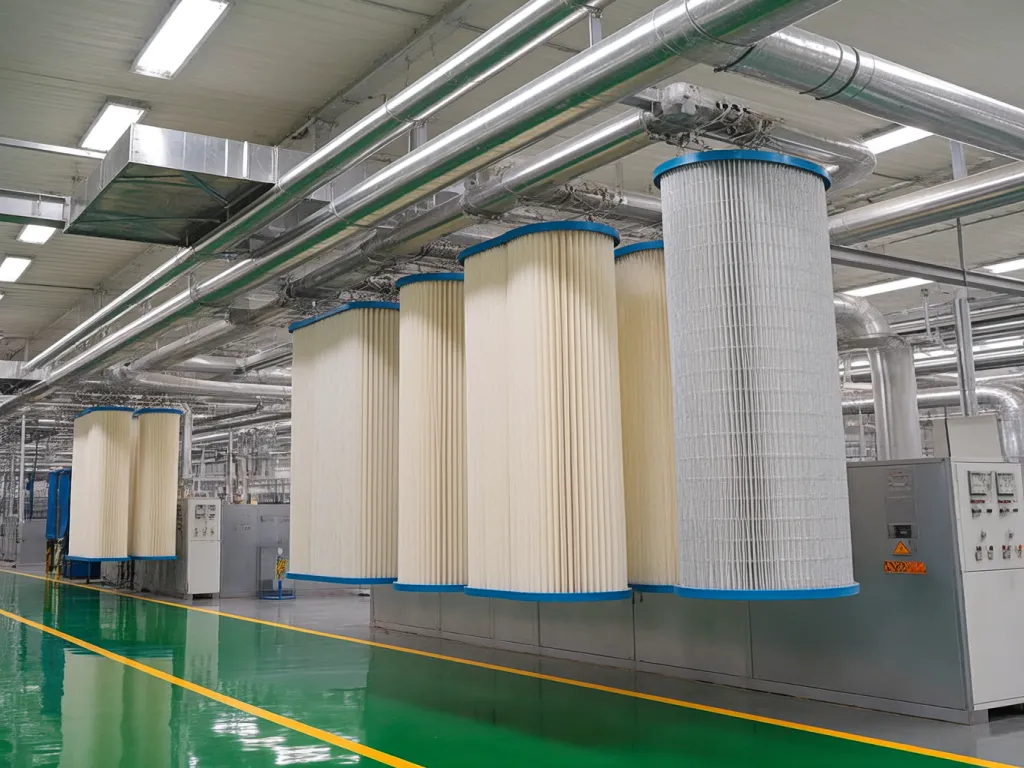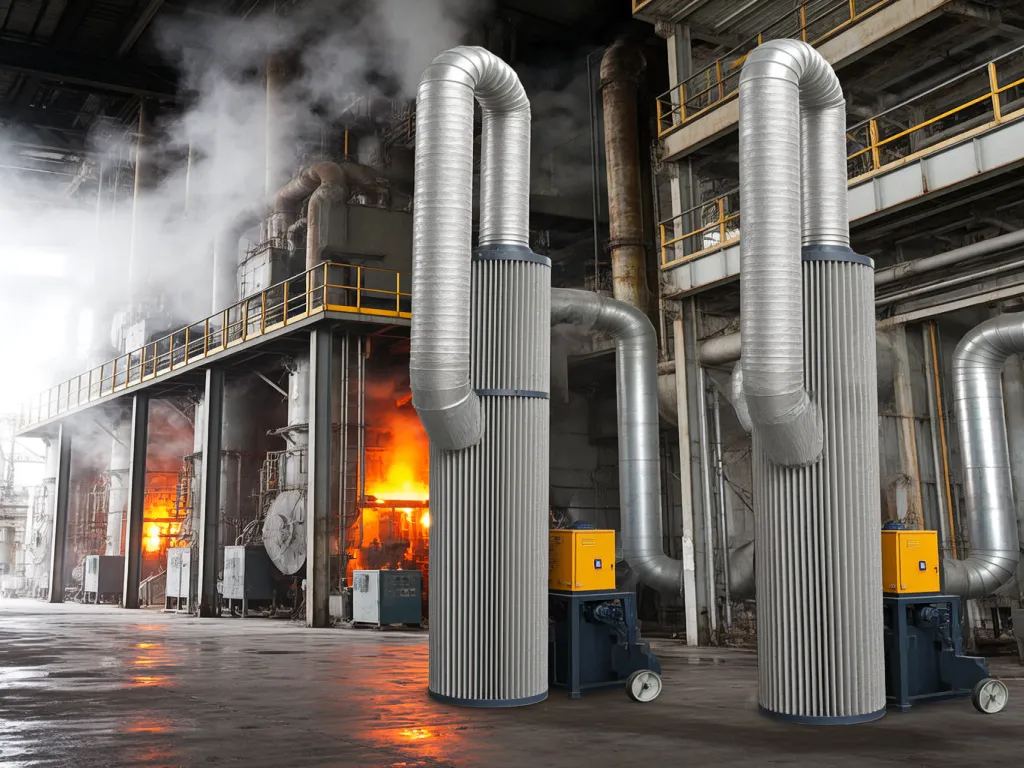Filter Bag Face-Off: Best Industrial Dust Solutions

When it comes to industrial dust collection, the choice of filter bag material can make or break your system’s efficiency. Picture this: you’ve invested in a top-tier dust collector, but the wrong filter bag material leads to frequent replacements, clogged systems, or even safety hazards. That’s why understanding the nuances of industrial filter bags for dust collection matters more than you think. In this guide, we’ll break down the pros and cons of polyester, glass fiber, and aramid options. Ready to find your perfect filter match?

Polyester Industrial Filter Bag for Dust Collection: Performance, Durability, and Applications
When it comes to choosing the right industrial filter bag for dust collection, the material is a game-changer. Polyester, as a widely used synthetic fiber, has carved out a significant niche in the filtration industry. But why is polyester such a popular choice, and how does it stack up against other materials in terms of dust collection efficiency, durability, temperature resistance, and chemical resistance? Let’s dive in and explore these aspects in detail.
Dust Collection Efficiency of Polyester Filter Bags
Polyester industrial filter bags excel in capturing fine dust particles, thanks to their dense weave and surface finish. The fibers are engineered to trap even the smallest particles, ensuring that the air exiting the filtration system is clean and free from contaminants. This high efficiency makes polyester bags ideal for industries where air quality is paramount, such as pharmaceuticals, food processing, and electronics manufacturing. For those seeking a high-efficiency industrial filter bag solution, polyester options provide reliable performance. But how exactly does polyester achieve this? The answer lies in its electrostatic properties. Polyester fibers naturally generate a static charge, which attracts and holds onto dust particles, preventing them from escaping back into the environment. This self-cleaning mechanism, combined with regular pulse-jet cleaning cycles, ensures consistent performance over time.
Durability and Longevity
One of the standout features of polyester filter bags is their durability. These bags are designed to withstand the rigors of industrial use, including abrasion from coarse dust particles and mechanical stress from cleaning cycles. Polyester’s inherent strength and resilience mean that these bags can last significantly longer than those made from less robust materials, reducing the need for frequent replacements and lowering overall maintenance costs. For a durable choice, consider exploring our high-efficiency, durable industrial filter bag. But what about wear and tear? Polyester’s molecular structure provides excellent resistance to abrasion, ensuring that the bags maintain their integrity even in harsh environments. Additionally, polyester is less prone to stretching and shrinking compared to natural fibers, which helps maintain a consistent fit and filtration efficiency over time.
Temperature Resistance
Temperature resistance is another critical factor to consider when selecting an industrial filter bag. Polyester filter bags can typically withstand continuous operating temperatures of up to 130°C (266°F), with short-term exposure to higher temperatures possible. This makes them suitable for a wide range of industrial processes, including those involving moderate heat. However, it’s essential to note that polyester’s temperature tolerance can vary based on the specific formulation and treatment of the fibers. Some polyester bags are treated with special coatings to enhance their heat resistance, making them suitable for even higher-temperature applications. When selecting a polyester filter bag, always check the manufacturer’s specifications to ensure it meets your process requirements.
Chemical Resistance
In industries where chemical exposure is a concern, polyester filter bags offer excellent resistance to a wide range of chemicals, including acids, alkalis, and solvents. This chemical inertness ensures that the bags do not degrade or react with the dust being filtered, maintaining their performance and extending their service life. But what about specific chemicals? Polyester’s resistance to chemicals is due to its stable molecular structure, which does not readily react with most substances. However, it’s always advisable to consult with the manufacturer or a filtration expert to confirm compatibility with specific chemicals in your process. In some cases, specialized coatings or treatments may be necessary to enhance chemical resistance further.
Ideal Applications for Polyester Filter Bags
Given their impressive performance characteristics, polyester industrial filter bags are well-suited for a variety of industrial applications. These include:
- Woodworking and Furniture Manufacturing: Capturing sawdust and wood particles to maintain a clean and safe working environment.
- Metal Processing: Filtering out metal shavings and fine particles generated during machining and grinding operations.
- Pharmaceuticals: Ensuring a sterile environment by capturing fine powders and particles during drug manufacturing.
- Food Processing: Removing dust and contaminants from ingredients and finished products to meet stringent hygiene standards.
- Chemical Manufacturing: Handling corrosive dusts and fumes while maintaining filtration efficiency.
In each of these applications, polyester filter bags offer a cost-effective and reliable solution for dust collection, ensuring compliance with environmental regulations and protecting worker health.

Glass Fiber Industrial Filter Bag for Dust Collection: A Comprehensive Analysis
When it comes to industrial filter bags for dust collection, glass fiber options stand out for several compelling reasons. If you’re in the market for a high-performance solution that balances efficiency and durability, understanding the unique characteristics of glass fiber filter bags is crucial. Let’s dive into what makes these bags a top choice for many industrial applications.
First and foremost, glass fiber industrial filter bags excel in filtering efficiency. The intricate weave of glass fibers creates a dense matrix that effectively captures even the finest dust particles. This high filtration rate is essential in industries where air quality standards are stringent, such as pharmaceuticals, food processing, and electronics manufacturing. By trapping more dust, these bags help maintain cleaner work environments and reduce the risk of airborne contaminants affecting product quality or employee health. For those seeking durable and custom solutions that align with these standards, glass fiber bags offer a compelling choice.
Another standout feature of glass fiber filter bags is their impressive heat resistance. Unlike some synthetic materials that may degrade or melt under high temperatures, glass fibers can withstand extreme heat without losing their structural integrity. This makes them ideal for use in industries like cement production, steel manufacturing, and incineration plants, where the dust collection process often involves high-temperature gases. The ability to maintain performance in such harsh conditions extends the lifespan of the filter bags and reduces the frequency of replacements, ultimately saving costs.
However, it’s important to acknowledge that glass fiber filter bags aren’t without their drawbacks. One notable limitation is their relative fragility compared to other materials. Glass fibers, while strong in tension, can be brittle and prone to breakage if mishandled or subjected to excessive mechanical stress. This means that during installation, maintenance, or cleaning, extra care must be taken to avoid damaging the bags. Despite this, with proper handling and regular inspection, the benefits of glass fiber often outweigh this minor inconvenience.
So, where exactly do glass fiber industrial filter bags shine the brightest? They’re particularly well-suited for environments with high dust loads and elevated temperatures. Industries such as power generation, where coal-fired boilers produce large volumes of hot, particulate-laden exhaust, benefit greatly from the heat resistance and filtration efficiency of glass fiber bags. Similarly, in the chemical industry, where corrosive gases and high temperatures are common, glass fiber bags offer a reliable and cost-effective solution for dust collection. For industries requiring high-efficiency and durable solutions, glass fiber bags are an excellent fit.
Moreover, glass fiber filter bags are often chosen for their compatibility with pulse-jet cleaning systems. These systems use bursts of compressed air to dislodge accumulated dust from the filter surface, extending the bag’s service life. The rigidity of glass fibers allows them to withstand the mechanical forces exerted during pulse-jet cleaning without compromising their filtration performance. This compatibility enhances the overall efficiency of the dust collection system and reduces downtime for maintenance.
In conclusion, glass fiber industrial filter bags for dust collection offer a compelling combination of high filtration efficiency, excellent heat resistance, and compatibility with advanced cleaning systems. While their relative fragility requires careful handling, the benefits they provide in demanding industrial environments make them a preferred choice for many applications. If you’re looking to optimize your dust collection process and ensure compliance with air quality regulations, considering glass fiber filter bags could be a wise move.

Aramid Fiber Industrial Filter Bag for Dust Collection: Strengths, Costs, and Selection Tips
When it comes to industrial dust collection, choosing the right filter bag material can make or break your system’s efficiency and longevity. Among the premium options available, aramid fiber industrial filter bags stand out for their exceptional performance in harsh environments. But are they the right fit for your specific needs? Let’s dive into what makes aramid fiber filter bags a top contender—and when their cost might be justified. For tailored solutions, consider exploring our durable industrial filter bag options designed for dust collection.
### Why Aramid Fiber Shines in Dust Collection
Aramid fibers, known commercially as brands like Nomex® or Kevlar®, are synthetic polymers with a unique molecular structure that grants them incredible strength and resilience. Here’s why they’re often the go-to choice for demanding industrial applications:
#### 1. High Tensile Strength: Built to Last
Aramid fibers boast a tensile strength several times higher than steel by weight. This means aramid filter bags can withstand intense mechanical stress without tearing or stretching, even when filtering abrasive dust particles. For industries like cement manufacturing, metal processing, or power generation—where dust particles can be sharp and heavy—aramid bags offer unmatched durability.
#### 2. Exceptional Thermal Resistance: Handle the Heat
One of aramid’s standout features is its ability to maintain structural integrity at high temperatures. Most aramid filter bags can operate continuously at temperatures up to 200°C (392°F), with some variants tolerating short bursts of heat beyond 250°C (482°F). This makes them ideal for:
- Incinerator exhaust systems
- Boiler flue gas cleaning
- Chemical processing plants with high-temperature reactions
#### 3. Chemical Resistance: Withstand Aggressive Environments
Aramid fibers are inherently resistant to many chemicals, including acids, alkalis, and organic solvents. This chemical stability prevents premature degradation, ensuring consistent filtration performance even in corrosive environments. Industries like pharmaceuticals, food processing, or waste-to-energy plants benefit greatly from this property.
### The Cost Factor: When Aramid Makes Sense
While aramid fiber filter bags offer superior performance, they come at a premium price—often 2-3 times more expensive than polyester or glass fiber alternatives. So, when does investing in aramid bags make financial sense?
#### Scenarios Where Aramid Pays Off:
- High-Temperature Operations: If your process generates flue gases above 150°C (302°F), aramid’s thermal stability prevents melting or shrinking, avoiding costly downtime.
- Abrasive Dust Conditions: In industries like sandblasting, mining, or foundry operations, aramid’s high strength reduces bag replacement frequency.
- Chemically Aggressive Environments: When dealing with acidic or alkaline dust, aramid’s chemical resistance extends bag life significantly.
- Long-Term Cost Savings: Though initial costs are higher, aramid bags often last 2-3 times longer than cheaper alternatives, reducing total cost of ownership.
#### When to Consider Alternatives:
- Low-Temperature Applications: For processes below 120°C (248°F), polyester or polypropylene bags may suffice at a lower cost.
- Non-Corrosive Environments: If your dust is inert and non-abrasive, glass fiber or polyester bags could be more economical.
- Budget Constraints: For startups or facilities with limited capital, starting with a less expensive material may be prudent, with plans to upgrade later.
### Selecting the Right Aramid Filter Bag
Choosing an aramid fiber industrial filter bag isn’t just about the material—it’s about finding the right blend of properties for your specific needs. Here’s what to consider:
#### 1. Aramid Type:
- Meta-Aramid (e.g., Nomex®): Excellent thermal stability and chemical resistance, ideal for most high-temperature applications.
- Para-Aramid (e.g., Kevlar®): Higher tensile strength, suitable for extremely abrasive environments.
#### 2. Surface Treatment:
- Singed/Glazed Finish: Reduces dust cake adhesion, improving cleaning efficiency.
- PTFE Membrane: Enhances filtration efficiency and extends bag life by preventing particle penetration.
#### 3. Construction:
- Needlefelt vs. Woven: Needlefelt aramid bags offer higher dust holding capacity, while woven bags provide better dimensional stability.
#### 4. Size and Fit:
Ensure the bag dimensions match your collector’s specifications to prevent air leakage and ensure proper pulse-jet cleaning.
### Making the Decision: Is Aramid Right for You?
Ask yourself these questions:
- Does my process involve temperatures exceeding 150°C (302°F) regularly?
- Am I filtering abrasive or chemically aggressive dust?
- Have I experienced frequent bag failures with cheaper materials?
- Can I justify a higher upfront cost for long-term savings?
If you answered ‘yes’ to most of these, aramid fiber industrial filter bags are likely a smart investment. For facilities with milder conditions, a hybrid approach—using aramid bags only in the most demanding zones—can balance performance and cost.
Remember, the best filter bag material is the one that aligns with your specific operational demands. Our team is here to help you analyze your needs and select the optimal solution—whether it’s aramid, polyester, glass fiber, or a combination. Ready to upgrade your dust collection system? Let’s talk!
Choosing the right industrial filter bag for dust collection isn’t just about specs—it’s about matching material strengths to your unique industrial demands. Polyester excels in cost-effectiveness, glass fiber thrives in high-temp environments, and aramid offers unmatched durability (albeit at a premium). By aligning your operational needs with material capabilities, you’ll strike the perfect balance between performance and cost. Still unsure which filter bag fits your setup? Contact our experts today for a tailored recommendation—because when it comes to industrial efficiency, every detail counts.

